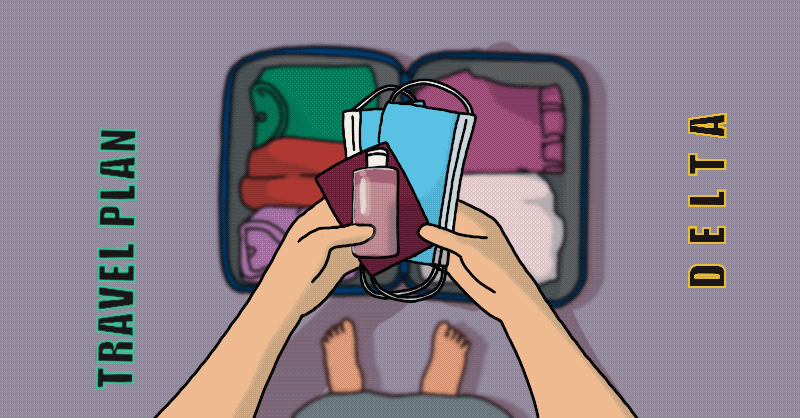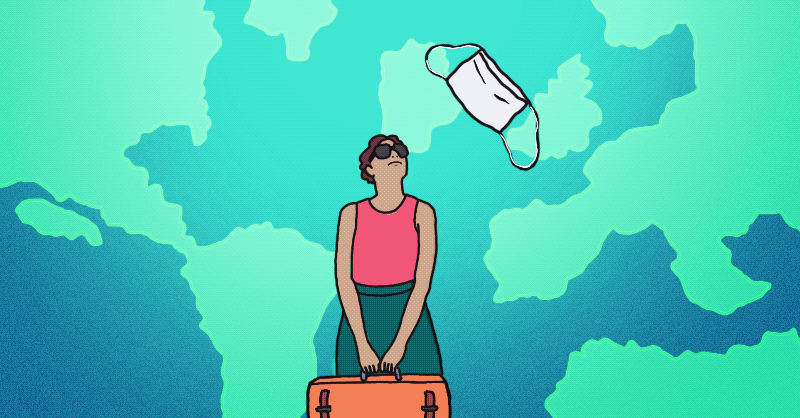
Not that long ago, we all optimistically thought we’d turned the corner. Many travelers reserved beach houses, booked flights, and got in line to renew their passports. Then came the very different Delta variant—a version of the COVID-19 virus that is extremely contagious and more serious than the first.
Recent news about breakthrough infections in vaccinated people and widespread cases among the unvaccinated are changing the way we think. The current recommendations beyond ‘get vaccinated’ is that people who are older, immunocompromised, or in the presence of children under 12 (who can’t get vaccinated yet) must revert to social distancing, wearing a mask, and staying away from anyone who isn’t vaccinated.
Here is the current information on how to (still) travel safely with the Delta variant on the loose.
Choose the right mask or double up
When we first donned masks, they ranged from a t-shirt pulled over your nose all the way to medical grade varieties. With more time comes more data and with a more aggressive virus, you may want to upgrade your mask.
- FFP1 masks are commonly used by builders to deflect coarse dust particles. They do not offer the desired protection against viruses.
- FFP2/N95/KN95 masks provide a greater level of protection for the wearer but should not be worn around highly infectious or at-risk people (i.e., unvaccinated).
- FFP3/N99/EN149/P3 masks effectively protect the wearer from droplets, protein molecules, bacteria, and viruses.
The air on planes is generally well-circulated and filtered, so your risk comes from the people who are sitting near you. Wearing a close-fitting cloth mask over an FFP2 mask will further reduce the risk of infection or accidentally spreading the virus if combined with strict hygiene protocols.
Make reservations for everything
With limited capacities to allow for social distancing, many places are requiring reservations and lots of those are filled weeks or months in advance. National parks, amusement parks, and tours may not be available if you don’t make reservations. As travel restrictions are reimposed to accommodate the Delta variant risks, even restaurant reservations may become necessary.
Plan for surprises and challenges
Thousands of travelers were left stranded on Monday after some of the largest airlines canceled hundreds of flights due to bad weather and staff shortages. Once your luggage is checked with the airline, you lose control of it and weather delays are not cause for the airline to accommodate you with food or hotel vouchers. If you’re traveling with children or there are staff shortages at the airport restaurants, you could be very happy you packed snacks and toothbrushes.
Have the right COVID test
Depending on where you go, and the rules change on a daily basis, you may have to show proof of vaccination and a negative COVID test. If you need a test for travel–either before you arrive or on your way home–you could end up scrambling for an appointment. Not all airports have testing available and not all tests are accepted. What is usually accepted (at least right now) is a PCR (polymerase chain reaction) test.
PCR tests generally take around 72 hours to get results and some urgent care facilities have introduced rapid PCR tests, which give results in around 30 minutes. Rapid PCR tests may not be accepted by some countries, so you’ll need to check before you try, and they can be expensive. If you’re in a location without a lot of testing sites, try the local drugstore.
Travelers coming to the US can use a self test but it must have a telehealth service that provides real-time supervision. The right test is a NAAT or antigen test with Emergency Use Authorization from the US Food and Drug Administration.
Other interesting news
Hungry? Why airport food is so expensive and how to eat, if not like a king at least well, for free at airports.
Public Wi-Fi, USB charging ports, and identity theft: Tips for keeping your personal information safe while traveling.
Road tripping with the pooch? Here are the safest, crash-tested harnesses, crates, and carriers for your furry friend.

